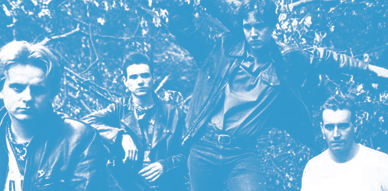
Thanks so much to Seori Burnett for the interview!
++ Hello Seori! Summerhill starts after the Snakes of Shake break up. What had happened? Why do you decide to start a new band?
The Snakes of Shake had been going to record an album for Stiff Records. this was shelved but a company called Making Waves came in and we recorded the same album ‘Gracelands and The Natural Wood’ for them. Shortly after the release of the record they went bust which made promoting the record difficult. The whole process had become a bit disillusioning and I felt the band had probably run its course. The guitarist at that time was Neil Scott who had previously played with Everything But The Girl and was Living in London, I was still in Scotland. As so often happens it seemed time to move things to the centre so I relocated to London and Neil and I worked on starting a new band together.
++ Why did you call the band Summerhill? Is there any reason behind it?
The name Summerhill came from our original bass player Isabel Monteiro who later went on to have a more successful career with her own band Drugstore. We were aware of the Summerhill school started by alternative educationalist A.S. Neil and empathised with the ethos of free choice and a truly democratic set up. The name seemed to sit well with our new inclusive and collaborative venture.
++ Was it easy to gather people to form Summerhill? I noticed you changed drummers quite often!
The drummer situation seems Spinal Tapesque doesn’t it. It wasn’t always easy to get the right people because at the beginning Neil and I had a very strong vision of the feel and sound we wanted to create. Basically at the core of Summerhill # 1 was Neil Scott, Keith Gilles on bass and myself and when we reformed it was Tom Crook on guitar with Keith and me again. Some people left some were asked to leave but thankfully there’s nobody I wouldn’t talk to anymore.
++ Were any of the band members involved with bands before Summerhill?
As I’ve mentioned Neil had been in EBTG and our drummer on Lowdown Iain Shedden had been in the eponymous Australian band The Saints. My brother also played drums with us and he had previously played in Scottish garage rock outfit the Primevals who continue to record and play to this day.
++ What was the aim of Summerhill’s music? What were your influences, I think your music has as much of country and folk as of pop!
Originally I was into American garage punk, Shadows of Knight, Standells, Electric Prunes as well as the Stooges, Velvet Underground, Neil Young, Television, Patti Smith, the Ramones etc. a lot of late 70s New York in other words. Neil and I shared many influences and particularly the more experimental edge of the Byrds, Murmur/Reckoning REM and the self styled ‘Cosmic American Music’ of Gram Parsons. Deep in my psyche things as diverse as the Incredible String band and Sun Ra were also at play.
There was always a tension between the more experimental and the straighter melodic approach of country and folk. I had started to feel that folk and country with its links to Scottish and Irish music had more resonance for me than the blues based side of rock’n’roll. I guess our aim was to fuse a more experimental visceral guitar sound with the melody and harmony of folk/pop music. It’s probably more evident on our first album Lowdown rather than West of Here where the workings of a major label smoothed off the edges before the experiment was developed enough.
++ As a Scottish band, how influential was Postcard’s ‘Sound of Young Scotland’ sound? Which where your favourite Glaswegian bands to share a gig with or maybe to just go and enjoy a gig from them?
I think that the influence of Postcard cannot be underestimated. The other night there was a documentary on UK tv about Rough Trade which made the claim for that label kicking off Indie Music in the 80s. We can debate whether this is the case or whether the ethos had already started with the Punk labels in the late 70s but for my money Postcard and particularly early Orange Juice epitomised what later became accepted as Indie with their homemade slightly amateurish but free approach to making music.
I was just starting to play gigs at that time and it was exciting to have something like Postcard going on in your home town attracting all the London media attention. I saw all the Postcard bands at the time but my favourites were Josef K who were from Edinburgh and another Edinburgh band on Postcard’s rival Fast Pop called the Fire Engines.
++ Did Summerhill gig a lot? Any particular gigs you remember? and why?
We did four UK tours and numerous other one-offs. We played a lot at a tiny pub backroom club run by Geoff Barrett the man behind Heavenly Records. The club was called the Phil Kauffman Club after Gram Parson’s infamous roadie, the gigs there really helped build us up. This was before the days of smoking bans, there was no ventilation, one narrow exit from the room and a deafening PA, a classic rock’n’roll dive, brilliant.
The best gigs were all on the way up, we played Dingwalls a famous old London venue and that’s when I realised something was happening. We were still driving our own van and didn’t have any roadies, it was a great gig and afterwards the promoter came up to us with me expecting the usual “we can only give you £50″ instead he said here’s your share of the door £400. On the way down it was a lot harder there were still some good nights but the thrill is gone and the audience gets it too.
++ You released in a couple of indie labels as Demon or Rocket 5 but also on a bigger one like Polydor. What was the difference between working with them? How did you get a deal with them and was it much harder to work with them than with an indie?
Youv’e done your homework! We released one ep on Rocket 5 a label started by a friend of ours in Scotland and then signed up for a mini album, ‘Lowdown’, with Demon. Lowdown received great reviews and as the gigs improved the major labels came sniffing around.
At the end of the 80s there was a financial bubble much like the one which has just burst. Majors were offering large advances so you tended to take the best deal on offer rather than critically evaluating the company and the people. We signed to Polydor which in retrospect was a mistake. We naivelly thought it was obvious what we were about, you only had to read our reviews but majors often buy something and then try to turn it into their own product to shift as many units as possible. REM were still to break big and they couldn’t see how to deal with or develop a left field folk/rock/pop crossover. They spent too much in production, got cold feet, the baggy seen exploded and we lost our way.
In comparison indies were where music fans lived, they could be fickle, purist and skint but in retrospect we should have done another record for Demon instead of grabbing the cash.
++ You released a single convering “Wild Horses” by The Rolling Stones. Did you do any more covers?
We covered ‘It happens each day’ and ‘Don’t make Waves’ for a Byrds tribute album under the pseudonym of Static. In the latter days of Summerhill we used to do ‘Song For You’ by Gram Parsons in our live set.
++ I’ve heard mixed reviews about your second album “West of Here” and raving reviews about “Lowdown”, your first album. How do you feel about both albums? Which release of yours is the one you are more proud about?
I guess I’ve covered a lot of this above. The songs on West of Here are just as good and in some case better than on Lowdown but the arrangements and production are too safe, and the prolonged recording process sapped the energy from our performance. Lowdown is an imperfect execution of a strong vision and West of Here is a one legged affair. When I occassionally do listen back there’s lots to be proud of on both but I also have ambivalent feelings about both. If I had to nail my colours to the mast Lowdown.
++ How political were the Summerhill during those tough last years under Thatcher’s rule? How was Glasgow during those years compared to 2009?
In a public way apolitical, in private very much against what the Thatcher years had done to Britain and angry about the lack of compassion. I can’t really speak for Glasgow then or now as I left in January ‘87 but I know that when I went back the prosperity in London and the South East was not reflected in my home town where it wasn’t hard to find areas with fire bombed houses, security meshes inside shops and communal stair wells with needles blood and human waste. It appears to me that Glasgow has steadily improved since the late 70s but there are still bad pockets of deprivation.
++ Out of curiosity, what is the best Scottish beer and the best Scottish dish for you?
My current favourite is Fraoch which means heather in Gaelic. It’s a light golden sweet hoppy ale. Best Scottish dish, Cullen Skink which is a chowder type soup made with Smoked Haddock, potato, milk and onion.
++ Why and when did the band call it a day? What did the Summerhill members do after?
The last time Tom, Keith and I sang together was at my wedding in 1998. The last record was a CD ep ‘No Matter What You Do’ in 1994. Of the Lowdown lineup. Iain Shedden lives in Sydney Australia plays in a couple of bands and is the music editor of the Australian newspaper, Keith still lives in London and teaches music business and production and does standup comedy. Neil returned to his home in Hornsea near Hull and still plays locally. Of the last incarnation, Tom as you know, is still in music and does a few things including his own ‘Band of Hope’. Our last drummer Ben has a musical project called Bonobo Banjo, check out their myspace site. Me I’m a crofter (very small traditional Scottish farm)in the northwest highlands of Scotland with my wife three children, sheep pigs, chickens and friut and veg still harbouring ambitions t o make more records when I get time.
++ Anything else you’d like to add?
When Neil and I were plotting the rise of Summerhill and writing together we’d take a break and clear our heads by watching films like the Terminator and laugh out loud. I’ll be back!
::::::::::::::::::::::::::::::::::::::::::::::::::::::::::::::::::::::::::::::::::::::::::::::

